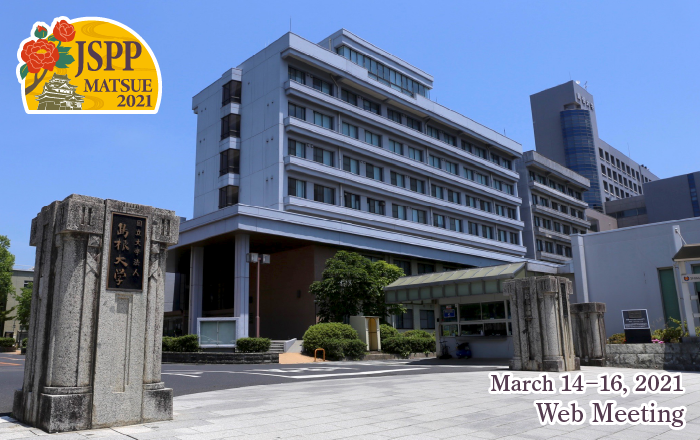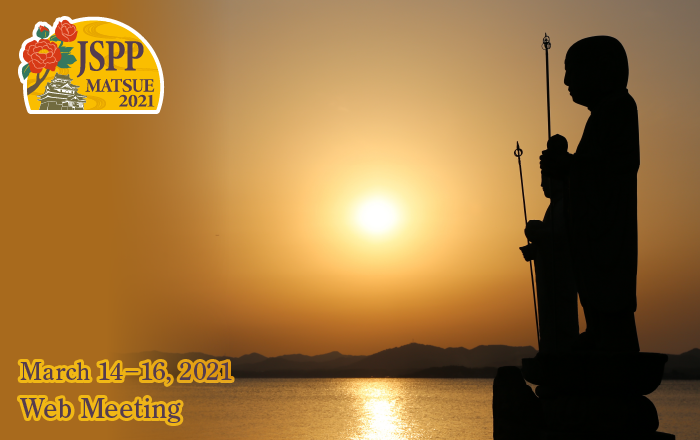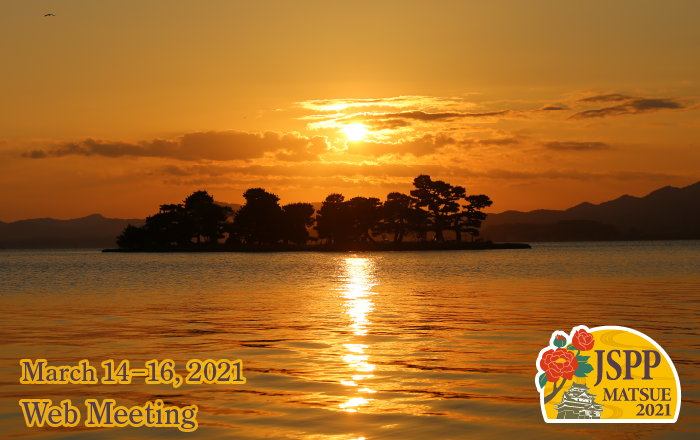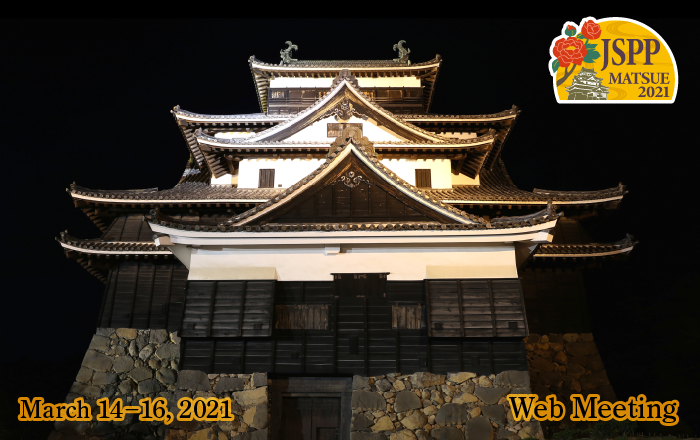The 62nd Annual Meeting of The Japanese Society of Plant Physiologists
March 14-16, 2021 Web Meeting
Logo design “The Blooming Peonies in Matsue" by Oshima-Yamada Yui
A design of many peonies, from buds to large flowers, bloom in Matsue Castle with a wish for further development of research.
General Information
3rd Announcement of 2021 (62th) Annual Meeting of the Japanese Society of Plant Physiologists
1. Important Notice
1) Online meeting
Because of the spread of COVID-19, the 62nd Annual Meeting in Matsue will be held online from March 14th to 16th. Registered participants can attend the meeting, including general presentations, symposia, ceremonies, and banquet via the ORSAM portal site using your ID and password for logging in. Please see the latest information on the meeting website.
2) Program and Abstract Book
- The program and abstracts are accessible electronically via the ORSAM portal site.
- A simple program booklet will be sent only to participants who have paid the registration fee.
- The PDF for the Abstract Book can be downloaded from the here only by participants who have paid the registration fee.
3) Registration of attendance
- Registration is already closed. Because of management restrictions of the online annual meeting, you cannot register for participation on the meeting days.
- The password for logging into the ORSAM portal site will be sent to registered participants.
4) Poster presentations [see also section “2. 1) General Presentations 3. Poster presentations”]
- Poster viewings and discussions will be carried out using the ORSAM portal site and its Comments section during the annual meeting (from 9:00 on Day 1 to 16:00 on Day 3).
- Poster discussions using Zoom meeting (only for presenters who wish it) are also scheduled for 13:00–14:30 on Day 3 (poster numbers beginning with PF) and 14:30–16:00 on Day 3 (poster numbers beginning with PL). It should be noted that it is NOT necessary for a presenter to create and register a Zoom ID. The organizing committee will arrange the Zoom meeting for poster discussion.
2. Notes for Presenters
When preparing figures and tables for your presentation, please refer to the website “Color Universal Design (CUD)—How to make figures and presentations that are friendly to colorblind people—” (http://jfly.iam.u-tokyo.ac.jp/color/).
1) General presentations
1. Qualification of presenters
In accordance with JSPP Article 7(3), the presenters of the Annual Meeting must be JSPP members. If you are a presenter who is in the process of enrollment, please complete the procedure and the payment of the membership fee before the Annual Meeting; otherwise, your presentation will be canceled.
2. Style of presentation
The type of presentation (poster or oral presentation) is decided by the program committee to meet the requests at the time of application, but if you select “No preference” at the time of application, please make sure to confirm the type of presentation through the program before proceeding with your preparations.
3. Poster presentations
Posters should be in English. If the presentation language is Japanese, please include the Japanese version of the title. A poster file should be prepared in the A format (width : height = 1 : √2 ) or a series of A4 (29.7 cm in width × 21.0 cm in height) sheets (viewers can see a poster by scrolling down the pages) and converted to a PDF whose file size must be smaller than 3 MB (less than 2 MB (strongly recommended) will work better in the system). Please upload the PDF to the registration system between February 24 and March 3. The details of how to upload a poster will be announced later. Note that participants can view but not download the PDF.
<Poster viewing and discussion>
- Poster viewings are basically carried out in the ORSAM portal site from 9:00 on Day 1 to 16:00 on Day 3. Questions and answers will be held in the Comments section of the ORSAM portal site.
<Poster discussion time using Zoom meeting (only for presenters who wish it)>
- Presenters can also have a discussion using Zoom meeting on the afternoon of Day 3. If you wish to have a Zoom meeting, please place a check mark for Zoom meeting when you upload the PDF (poster file). The poster discussion times are as follows:
For presentations (poster numbers beginning with PF): 13:00–14:30 on Day 3.
For presentations (poster numbers beginning with PL): 14:30–16:00 on Day 3. - At the appointed time, enter your breakout room in the Zoom meeting from “Room P” in the ORSAM portal site, and discuss your poster.
4. Oral presentations
- Slides used in oral presentations should be in English. Prepare a brief summary slide in English as the last slide.
- Each presentation is allotted a 15-min slot, a talk for 12 min and discussion for 2 min 30 s, followed by a 30 s interval before the next speaker. To keep the session on schedule, please strictly follow the time limits.
- Each session will be presented using the Zoom webinar. The presenter will participate in the webinar as a panelist.
Please enter the webinar via the special link for a panelist, which will be notified from the Organizing Committee in advance. When your turn comes, please show your slides by sharing the screen and turn on the microphone and video in the Zoom webinar. - Your connection to the Zoom webinar will be tested in advance. We will contact you with the details such as the date, time and method.
- Questions and answers will be given via the Q&A function or verbally (by raising hands) in the Zoom webinar. When using the Q&A function, a chairperson will read aloud a question in the Q&A in place of the questioner and then prompt the presenter to answer the question. Please answer it verbally. In the case of verbal questions and answers (by raising hands), the questioner will ask the presenter a question verbally only if a chairperson allows it. Please answer it verbally.
- After a session is finished, the contents of the Q&A will be published in the ORSAM portal site.
- The webinar for one session will be closed 10 minutes after the session is finished. Presenters and participants can discuss topics of interest in the breakroom (SpatialChat) corresponding to each session.
- You can have questions and answers via the Comments section corresponding to each oral presentation.
2) Symposium presentations
The procedures for symposium presentations are the same as those for oral presentations except for the presentation time slots. Please refer to “4. Oral presentations” above or ask the organizers of your symposium for details.
3. Notes for Chairpersons
- Please select a set of oral presentations for which a chairperson will be responsible by consulting with the other chairpersons of the assigned session beforehand.
- The chairperson will participate in the Zoom webinar as a panelist. Please enter the webinar via the special link for a panelist, which will be provided by the Organizing Committee in advance. After entering the webinar, you (as a panelist) will be converted to a cohost by the host (person in charge in the Organizing Committee).
- Questions and answers will be given via the Q&A function or verbally (by raising hands) in the Zoom webinar. Please read aloud a question in Q&A in place of the questioner, and then prompt the presenter to answer the question. In the case of verbal questions and answers (by raising hands), please allow the questioner to ask a question verbally.
- After a session is finished, the contents of the Q&A will be published in the ORSAM portal site.
- The webinar for a session will be closed 10 minutes after the session is finished. Presenters and participants can discuss topics of interest in the breakroom corresponding to each session.
4. Notes for Participants (Viewers)
1) Participation in the meeting and discussion with Comments section in the ORSAM portal site
- The registered participants can attend the meeting including general presentations, symposia, ceremonies, and banquet by logging into the ORSAM portal site using your ID and password for logging in.
- The Comments sections corresponding to all the presentations (oral presentations, poster presentations, symposia) are available in the ORSAM portal site. You can discuss contents of presentations during the annual meeting, and receive a notification when an answer to your question is made.
2) Participation in oral presentations
- Oral presentations will be held using the Zoom webinar. You can attend a webinar of interest by selecting a “Zoom link” corresponding to each session/presentation. A microphone and video is not available unless a chairperson allows its use.
- A Zoom webinar will be open 30 minutes prior to the start of each session.
- Questions and answers will be given by Q&A or verbally (by raising hands) in the Zoom webinar. When using the Q&A function, please post your question(s) to the Q&A section in the Zoom webinar (Note that the registration number of oral presentation should be included in the question for correspondence). A chairperson will read aloud a question in Q&A in place of a questioner, and then a presenter will answer the question. Questions and answers verbally (by raising hands) is available for questioners, only if a chairperson allows it. When possible, the questioner can ask the presenter a question verbally after the microphone is turned on.
- After a session is finished, the contents of the Q&A will be published in the ORSAM portal site.
- You can have questions and answers via the Comments section in the ORSAM portal corresponding to each oral presentation.
- The webinar for one session will be closed 10 minutes after the session is finished. Presenters and participants can discuss topics of interest in the rest room (SpatialChat) corresponding to each session.
3) Participation in poster presentations
- Poster viewings are basically carried out in the ORSAM portal site from 9:00 on Day 1 to 16:00 on Day 3. Questions and answers will be held in the Comments section in the ORSAM portal site.
- Poster discussions using Zoom meeting (only for presenters who wish it) are also scheduled at 13:00–14:30 on Day 3 (poster numbers beginning with PF) and at 14:30–16:00 on Day 3 (poster numbers beginning with PL). At the appointed time, enter your breakout room in the Zoom meeting from “Room P” in the ORSAM Portal site, and discuss your poster.
5. Patents
Upon the revision of “Operational Guidelines for Applicants Seeking the Application of Exceptions to Lack of Novelty of Invention”, a certificate of presentation unnecessary. Therefore, JSPP will not issue such a certificate in this Annual Meeting.
6. Information security
The participants in this annual meeting must agree not to tell third parties various passwords and URLs, not to record or shoot presentation screens, and not to disseminate unpublished results learned at the meeting. In addition, the presenters should understand that the risk of recording and shooting of your presentation and unpublished results will be increased at the online meeting compared with a conventional meeting. On the basis of the consent of the participants to the confidentiality obligation, the annual committee will take measures, such as stopping the recording function of the zoom webinar and setting poster files to not downloading, to prevent participants from recording or shooting the presentation as much as possible.
7. Contact Information
• Contact to the Conference Secretariat
Send any questions to the Annual Meeting Committee by e-mail to jspp2021@nacos.com.
In case of emergency, call the number shown in the meeting website.
8. Mixer
Date and time: Day 1, March 14 (Sun) 18:30–20:30
Venue: ORSAM portal site (SpatialChat)
9. Banquet
Date and time: Day 2, March 15 (Mon) 18:30–20:30
Venue: ORSAM portal site (SpatialChat)
10. JSPP Awards Ceremony and Award Lectures
Date and time: Day 2, March 15 (Mon) 16:30–18:15
Venue: Room W (Zoom webinar)
*Please see the program![]()
11. Symposia
Twelve symposia will be held using the Zoom webinar platform. For the contents and purpose of each symposium, please see the here. The program is available here![]() .
.
Date and time: Day 1, March 14 (Sun) 9:30–12:30
♦S01 Toward understanding emergence of order in Plant-Microbe Holobiont (Room X)
♦S02 The universality and diversity of stem cell regulation revealed from the study of basal plants (Room Y)
Date and time: Day 1, March 14 (Sun) 14:00–17:10
♦S03 Frontiers of Plant Genome Editing to shape the future with new technologies (Room X)
♦S04 Re-optimization of Energy Transduction in Photosynthesis – Structure, Function and System (Room Y)
♦S05 Mineral element transport systems in plants: transporters, regulation and utilization (Room Z)
Date and time: Day 2, March 15 (Mon) 9:00–12:00
♦S06 Frontiers in plant redox biology: Redox regulation, oxidative stress and signaling (Room X)
♦S07 A new perspective for integrated Bio-metal Science (Room Y)
♦S08 Past and future of plant RNA research answering fundamental questions (Room Z)
Date and time: Day 2, March 15 (Mon) 13:00–16:00
♦S09 Molecular elucidation of plant environmental adaptation toward engineering responses of field-grown plants (Room X)
♦S10 Borderless Era of Plant Chemical Research – New Trends in Plant Chemical Biology and Plant Metabolite Chemistry (Room Y)
Date and time: Day 3, March 16 (Tue) 9:00–12:00
♦S11 Elongate, bend, and expand: Deciphering plant growth strategy from its mechanics (Room X)
♦S12 Molecular Mechanisms of Transcriptional Repression in Plants (Room Y)
12. The 17th Database Workshop
Date and time: Day 1, March 14 (Sun) 9:30–12:30
Venue: Room Z (Zoom webinar)
Organizers: Kentaro Yano (Meiji Univ.)
Please see the detail and program![]() .
.
13. Special Program: “Research Presentations by High School Students”
A special program, “Research Presentations by High School Students” will be held during the Annual Meeting. It is expected that many high school students will participate in the special program and carry out active discussion. Awards will be given to high school students on a competitive basis. Also, this year, an open lecture will be held to encourage interest in plant science and life science among high school students who will play active roles in the next generation. The abstracts of poster presentations by high school students will be distributed as a separate supplement (PDF).
Date and time: Day 3, March 16 (Tue) 13:00–18:00
Venue: Room Q (Zoom webinar / Zoom meeting)
Sponsor: Shimane Prefectural Board of Education
13:00–14:30
The 1st half core time of poster presentations
(poster presentation, question-and-answer session)
14:30–16:00
The 2nd half core time of poster presentations
(poster presentation, question-and-answer session)
16:00–17:30
Open lecture “Flowers Will Bloom–Plant World Coloring a High School Textbook of the Biology–”
Program
16:00–16:10
Opening Remark, Dr. Kazuhito Akama (Shimane Univ.)
16:10–16:35
Developmental and Genetical Bases of Pattern Formation in Flower, Dr. Koji Goto (RIBS Okayama)
16:35–17:00
Inside the Flower: Cell World Enabling Double Fertilization, Dr. Tetsuya Higashiyama (ITbM, Nagoya Univ. / Grad. Sch. Sci. The Univ. of Tokyo)
17:00–17:25
Development of Blue Flowers by Genetic Engineering, Dr. Yoshikazu Tanaka (Suntory Global Innovation Center)
17:25–17:30
Closing Remark, Dr. Tsuyoshi Nakagawa (Shimane Univ.)
Chairperson: Dr. Kazuhito Akama (Shimane Univ.)
17:30–18:00
Award ceremony
14. Luncheon/Evening Seminars
Registration is not required.
*Please see the program![]()
♦Luncheon Seminar on Gender Equality “Why are there so few female researchers in Japan? Considerations based on a large survey for 18,000 researchers.”
Date and time: Day 1, March 14 (Sun) 12:45–13:45
Venue: Room W (Zoom webinar)
Organizer: JSPP Gender Equality Committee
♦PCP Evening Seminar “Plant & Cell Physiology: publishing in the time of Covid-19”
Date and time: Day 1, March 14 (Sun) 17:15–18:15
Venue: Room W (Zoom webinar)
Organizer: PCP Editors Committee, Sponsor: Oxford University Press
♦Illumina K.K. Luncheon Seminar
Date and time: Day 2, March 15 (Mon) 12:00–12:50
Venue: Room W (Zoom webinar)
Organizer: Illumina K.K.
♦OLYMPUS CORPORATION Luncheon Seminar
Date and time: Day 3, March 16 (Tue) 12:00–12:50
Venue: Room W (Zoom webinar)
Organizer: OLYMPUS CORPORATION
15. Satellite Meetings
Please see here for the programs![]()
♦The 23th Plant Organelle Workshop
Date and time: March 13 (Sat) (The day before the Meeting), 13:00–18:50
Venue: Room J (Zoom webinar)
Organizers: Dr. Yoshiki Nishimura (Kyoto University)
Cellular organelles play key roles in the development, function, homeostasis, and environmental adaptation of plants. This workshop provides an opportunity for plant scientists of various disciplines to exchange latest findings, ideas, and relevant techniques regarding plant organelles, and for communication and discussion. Invited speakers will address topics, including chloroplasts, mitochondria, other cellular organelles, and whole plants from the molecular level to the environmental level.
This workshop is free to all participants, but they are encouraged to register on our website. People who wish to join should register at our website below by Friday, March 12.
Contact addresses: Yoshiki Nishimura, E-mail: nishimura.yoshiki.5n@kyoto-u.ac.jp
Yusuke Kato, E-mail: yusuke.kato@setsunan.ac.jp
Web site: http://www.rib.okayama-u.ac.jp/OWS/
♦The 6th Workshop on Photosynthetic Bacteria
Date and time: The day before the Meeting, March 13 (Sat) 14:00–17:40
Venue: Room K (Zoom meeting)
Organizers: Dr. Jiro Harada (Kurume University), Dr. Yusuke Tsukatani (Japan Agency for Marine-Earth Science and Technology), Dr. Chihiro Azai (Ritsumeikan University)
Contents: Anoxygenic photosynthetic bacteria are now subjects for various fields of studies including biochemistry, molecular biology, structural biology, biophysics, bioorganic chemistry, microbial ecology, etc. This workshop invites speakers talking their latest achievements and provides new insights into studies on anoxygenic photosynthetic bacteria through discussion. Registration fee is free. After the workshop, we will have an online-banquet. To resister the workshop and/or banquet, please fill the Entry Form (https://bit.ly/3mMwoEU) (deadline, 03/05/2021). We are expecting your participation.
Contact addresses:
Jiro Harada, E-mail: jiro_harada@med.kurume-u.ac.jp,
Yusuke Tsukatani, E-mail: tsukatani@jamstec.go.jp
Chihiro Azai, E-mail: cazai@fc.ritsumei.ac.jp
♦The 38th Meeting of the Japanese Society for Young Plant Physiologists
Date and time: Day 1, March 14 (Sun) 19:00–20:30
Venue: Room J (Zoom meeting)
Organizers: Dr. Rumi Amano (RIKEN BRC), Dr. Tatsuya Nobori (Salk Institute)
This meeting offers young scientists and students the opportunity to exchange information and discuss topics related to research and career development. We invited two speakers to share their own stories with us. A virtual mixer will be held after the program. More details are available on the meeting website (http://jsyppmeeting.wixsite.com/wakatenokai).
Registration due on March 12: https://forms.gle/fMLMmXPqX87FzRv56
Contact addresses:
Rumi Amano: rumi.amano@riken.jp
Tatsuya Nobori: tnobori@salk.edu
♦The Workshop on Remodeling Plant Reproduction
Date and time: Day 1, March 14 (Sun) 18:30–20:00
Venue: Room K (Zoom meeting)
Organizers: Dr. Daisuke Maruyama (Yokohama City University), Dr. Yoko Mizuta (Nagoya University), Dr. Shohei Yamaoka (Kyoto University)
Plants use a reproductive system distinct from animals, in which gametes are formed in haploid multicellular gametophyte. The other gametophytic cells are also highly differentiated and cooperate with each other to elaborate fertilization process. These gametophytic cells also harbor plasticity and flexibility in the fate determination and differentiation. In this workshop, our studies regarding the Grant-in-Aid for Transformative Research Area (B) entitled “Remodeling Plant Reproduction System by Cell Fate Manipulations”, focusing on the gametophytic cell differentiation and function, will be shown and the future prospects of plant reproductive research will be discussed. Any feedbacks and advices well beyond the fields of research are welcome.
The Zoom URL will be announced in the portal site of the JSPP annual meeting 2021.
If you wish to join this workshop but not attend the JSPP meeting, please register for your participation at the link below by 10th March (Wed.), and the Zoom URL will be sent to you later via E-mail.
https://forms.gle/nCPdR8eVWwjxNurB6
Contact addresses: Shohei Yamaoka: syamaoka@lif.kyoto-u.ac.jp
16. JSPP Committee Meetings
Date and time: March 13 (Sat) (The day before the meeting)
Venue: Zoom meeting
14:30–17:00 Board of Delegates’ Meeting
The other committee meetings will be held online on other dates.
The invitations will be sent to the members from the Conference Secretaria.



